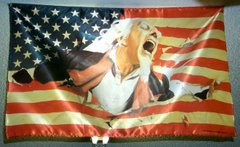
"The Great Wealth Transfer" is essential reading in the new issue of Rolling Stone. Paul Krugman, New York Times columnist and Princeton professor, describes how what appear to be good economic numbers aren't good for the vast majority of people in the U.S.
The blame, he says, goes to corporate wealth - which is not shared with workers, and is instead lavished on corporate executives at historically astronomical rates - and the politics of conservatism - which make way for tax cuts to the wealthiest among us, and also work to weaken labor unions and keep down the minimum wage. The assault on unions and the minimum wage began, Krugman writes, in the 1970s, but kicked into high gear when Ronald Reagan became president in 1980. The situation got only slightly better in the 1990s, but the current Bush regime has gone beyond what was seen in the Reagan years.
All of this has brought American society back to a time before the New Deal when the very rich lived far apart from the rest of the nation. Indeed, that seems to be the conservatives' goal, and it has been for some time. In the 19th Century, the distribution of money and power was far different from what we came to know in the 20th Century, and if the conservatives have their way, the nation will continue on a path like that before the New Deal, labor unions, government oversight of business and so on. Rather than creating a democracy in which all classes of people have a chance to share in the nation's wealth, the conservatives and those corporate leaders whom they truly represent would prefer a system more akin to feudalism.
If for no other reason, this is why it is important to vote against these kinds of interests and support more progressive candidates. It's also why it is important to support, and if possible join, a labor union. Here is an iron-clad guarantee: Corporate America does not have your - or the public's - best interests at heart.
["The Great Wealth Transfer" can be read online here. The article is also in the Dec. 14 issue of Rolling Stone.]
The blame, he says, goes to corporate wealth - which is not shared with workers, and is instead lavished on corporate executives at historically astronomical rates - and the politics of conservatism - which make way for tax cuts to the wealthiest among us, and also work to weaken labor unions and keep down the minimum wage. The assault on unions and the minimum wage began, Krugman writes, in the 1970s, but kicked into high gear when Ronald Reagan became president in 1980. The situation got only slightly better in the 1990s, but the current Bush regime has gone beyond what was seen in the Reagan years.
All of this has brought American society back to a time before the New Deal when the very rich lived far apart from the rest of the nation. Indeed, that seems to be the conservatives' goal, and it has been for some time. In the 19th Century, the distribution of money and power was far different from what we came to know in the 20th Century, and if the conservatives have their way, the nation will continue on a path like that before the New Deal, labor unions, government oversight of business and so on. Rather than creating a democracy in which all classes of people have a chance to share in the nation's wealth, the conservatives and those corporate leaders whom they truly represent would prefer a system more akin to feudalism.
If for no other reason, this is why it is important to vote against these kinds of interests and support more progressive candidates. It's also why it is important to support, and if possible join, a labor union. Here is an iron-clad guarantee: Corporate America does not have your - or the public's - best interests at heart.
["The Great Wealth Transfer" can be read online here. The article is also in the Dec. 14 issue of Rolling Stone.]
More info: New Deal Network

